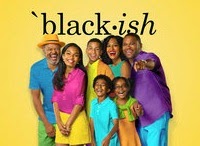  |
| Photo source |
I’ve heard many opinions from several points of view, but I absolutely love “Black-ish”, the new series in ABC’s fall line-up, and I highly recommend it! Many have likened it to a modern-day “The Cosby Show,” but I don’t think the two are really in the same category. It’s its own show, addressing issues in a different way. So the fact that it’s a middle-class Black family doesn’t put it in the same box, in my opinion.
I love the way racial issues in America are addressed head-on, like in the pilot episode, where Anthony Anderson’s character (Dré) excitedly anticipates a promotion at his job, only to be appointed as the new Senior Vice President of Urban Division (at which point, we hear Dré’s thoughts: “Wait. Did they just put me in charge of Black stuff?”).
The episode that really should solidify this show’s place in American society, in my opinion, is “The Nod” (aired October 8, 2014). It opens with Dré and his son (“Junior”) carrying a large, awkward “Lord-of-the-Rings-type” project across Junior’s school campus, while we hear Dré’s inner monologue, part of which says, “…but the thing that always helps you through your struggle is having a sense of community.” As they pass another father and son (who are also Black, in an environment where there aren’t many other Black people), Dré nods at the other father, who intuitively nods in return (this “nod,” however, is really more of a “reverse” nod). We then see Dré look at Junior perplexed, when he notices that Junior not only neglects to nod at the pair, but he barely looks in their direction.
Dré: “Hey. Why didn’t you give that kid the nod?”
Junior: “The nod?”
Dré: “Yes, the nod. To acknowledge that you’ve seen him.”
While Dré expresses his shock and dismay at the dinner table that evening, his wife, “Rainbow” (Tracee Ellis Ross) says to him, “The truth is that Junior’s generation has a different perspective on the struggle than you and Pops [Dré’s father, who lives with the family]. Can’t you just let that be a good thing?”
Dré spends the rest of the episode, desperately bound and determined to find Black male friends for Junior. At one point, he even expresses the fact that he blames himself for Junior not being surrounded by more Black people; he hangs his head in shame as Junior does a Pilates exercise before playing basketball at a recreation center in Compton, California.
The irony of this quest is that Dré finds himself having more communication with a Black man (Charlie) at his job, but it turns out that he’s not fond of Charlie at all, even though he’s Black. It’s at this point that I thought I got the gist of it, the “lesson” we’re supposed to get at the end of a situational comedy episode. I thought that by seeing for himself that he doesn’t necessarily bond with all Black people, Dré would gain understanding. I wasn’t entirely correct.
Dré quickly discovers that Charlie is awkward, pushy, has no boundaries, and has absolutely no ability to read social cues. But Dré has stars in his eyes once he realizes that Charlie has a son around Junior’s age (Eustace), so he invites them over for dinner, rationalizing that it’s worth it if it “gets Junior a new Black friend.” However, it’s during this social setting that his dislike for Charlie intensifies, and he reaches his limit. All of a sudden, upon reaching his boiling point, he storms upstairs to Junior’s room to tell Eustace that it’s time for them to leave. He even yells, “You ain’t got no more Black friends at my house!” So Junior and Eustace quickly wrap up their discussion (around the same “Lord of the Rings” project from the beginning of the episode), express extreme excitement through a “chant” of some sort, and bond over their passion for this mythical world. We then once again become privy to Dré’s inner thoughts (which circle back to Rainbow’s statement near the beginning of the episode):
“And it was at that moment I realized that struggle comes in a lot of different forms. Junior’s was just different from mine. But no matter what your fight, you still need your community.”*
Now what’s “Black-ish” about that? Isn’t this true for all of us? Don’t we all have some sort of struggle? Don’t we all yearn to find where we feel most comfortable? Don’t most parents struggle, at some point, with the desire to make their children fit into some kind of mold? Don’t parents sometimes struggle with accepting their children’s preferences when they differ from theirs?
I think it’s safe to say that we’re all Black-ish.
*The episode ends with Dré and Junior walking through campus again, Junior nodding at another student (who isn’t Black), and Dré saying, “And you need to let them know, ‘I see you, bro.’ And for Junior, nerd is the new Black.”